- Home
- Ellen Datlow
Echoes Page 2
Echoes Read online
Page 2
The kitchen’s overhead light, a dirty yellow fixture, flashed on. I saw a little hand leave the switch and disappear behind a door across the room from me. On top of the oven was a cast iron, black skillet. Little sis flashed her arm back into the room and turned out the light.
Kelly loomed over me (she was at least three inches taller) and said that this was not the same oven, and everyone who ever lived here has tried getting a new one, but you can still sometimes hear Mr. Black clanging around inside.
The oven door dropped open with a metal scream, like when an ironing board’s legs were pried opened.
I jumped backward and knocked into the kitchen table.
Kelly hissed, “That’s too hard, be careful! You’re gonna rip the oven door off!”
Little sis dashed into the room and I could see in her hands a ball of fishing line, which was tethered to the oven door handle.
Kelly asked me what I thought of the tour opener, if I found it satisfactory. I swear that is the phrasing she used.
Mortified that I’d literally jumped and sure that she could hear my heart rabbiting in my chest, I mumbled, “Yeah, that was good.”
The tour moved on throughout the darkened first floor. All the see-through lace curtains were drawn, and either Kelly or little sis would turn a room’s light on and off during Kelly’s readings. Most of the stories featured the hapless descendants of the Blacks. The dining room’s story was unremarkable as was the story for the living room, which was the largest room on the first floor. I’d begun to lose focus, and let my mind wander to Kelly and what she was like when her parents were home, and then, perhaps oddly, what her parents were like, and if they were like mine. My dad had recently moved from the Parker Brothers factory to managing one of their warehouses, and Mom worked part-time as a bank teller. I wondered what Kelly’s parents did for work and if they sat in the kitchen and discussed their money problems too. Were her parents kind? Were they too kind? Were they overbearing or unreasonable? Were they perpetually distracted? Did they argue? Were they cold? Were they cruel? I still wonder these things about everyone else’s parents.
Kelly did not take me into her parents’ bedroom, saying simply, “Under construction,” as we passed by the closed door.
I suggested that she make up a story about something or someone terrible kept hidden behind the door.
Kelly to this point had kept her nose in her script cards and jotted down notes with a pencil when not watching for my reaction. Her head snapped up at me and she said, “None of these are made-up stories, Paul.”
There was another bedroom, the one directly off the kitchen, and it was being used as an office/sitting room. There was a desk and bookcases tracing the wall’s boundaries. The walls were covered in brownish-yellow wallpaper and the circular throw rug was dark too; I don’t remember the colors. It’s as though color didn’t exist there. The room was sepia, like a memory. In the middle of the room was a rolling chair, and on the chair was a form covered by a white sheet.
Kelly had to coax me into the room. I kept a wide berth between me and the sheeted figure, aware of the possibility that there was someone under there waiting to jump out and grab me. Though the closer I got, the shape wasn’t uniform and the proportions were all off. It wasn’t a single body; the shape was comprised of more shapes.
Kelly said that the ghost of a man named Darcy Dearborn (I remember his alliterative name) haunted this room. A real estate mogul, he purchased the house in 1923. He lost everything but the house in the 1929 stock market crash and was forced to rent the second and third floors out to strangers. He took to sitting in this room and listening to his tenants above walking around, going about their day. Kelly paused at this point of the story and looked up at the ceiling expectantly. I did too. Eventually we could hear little footsteps running along the second floor above us. The running stopped and became loud thuds. Little sis was jumping up and down in place, mashing her feet into the floor. Kelly said, “She’s such a little shit,” shook her head, and continued with the tale. Darcy, much like Mrs. Black from all those years before, became housebound and wouldn’t leave this room. Local family and neighbors bought his groceries for him and took care of collecting his rent checks and doing his banking and everything else for him, until one day they didn’t. Darcy stayed in the room and in his chair and he died and no one found him until years later and he’d almost completely decomposed and faded away. His ghost shuts the doors to the office when they are open.
Behind us, the door to the kitchen opened and shut.
I remember thinking the Darcy story had holes in it. I remember thinking it was too much like the first Mrs. Black story, which muted its impact. But then I became paranoid that Kelly had tailored these stories for me somehow. Was she implying that I was doomed to be a loner, a shut-in because I stayed home by myself too much? I had one new friend I’d met in sixth grade but he lived in North Beverly and spent much of his summer in Maine and I couldn’t go see him very often. I wasn’t friends with anyone in my neighborhood. That’s not an exaggeration. Throughout that summer, particularly if I’d spent the previous day watching TV or shooting hoops in the driveway by myself, Mom would give me an errand (usually sending me down the street to the White Hen Pantry convenience store to buy her a pack of cigarettes—you could do that in the Eighties) and then tell me to invite some friends over. She never mentioned any kids by name because there were no kids to mention by name. I told her I would but would then go ride my bike instead. That was good enough for Mom, or maybe it wasn’t and she knew I wasn’t really going to see or play with anyone. Mom now still reacts with an unbridled joy that comes too close to open shock and surprise when she hears of my many adult friends.
I envisioned myself becoming a sun-starved, Gollum-like adult, cloistered in my sad bedroom at home, until Kelly led me out of the first-floor living space to the cramped and steep staircase. The stairs were a dark wood with a darker stair tread, or runner. The walls were panels or planks of the same dark wood. I was never a sailor like Mr. Black, but it was easy to imagine that we were climbing up from the belly of a ship.
Kelly said that a girl named Kathleen died on the stairwell in 1937. Kathleen used to send croquet balls crashing down the stairs. Her terrible father with arms and hands that were too long for his body got so sick of her doing it, he snuck up behind her and nudged her off the second-floor landing. She fell and tumbled and broke her neck and died. There was an inquest and her father was never charged. However, his wife knew her husband was lying about not being responsible for Kathleen’s death and the following summer she poisoned him and herself while picnicking at Lynch Park. At night you can hear Kathleen giggling (Kelly’s sister obliged from above at that point in the tale) and the rattles and knocks of croquet balls bouncing down the stairs. And if you’re not holding the railing, you’ll feel those cold, extra-large hands push you or grab your ankles.
I wasn’t saying much of anything in response at this point and was content to be there with Kelly, knowing I would likely never spend this much time alone with her again. I was scared but it was the good kind of scared because it was shared if not quite commiserative.
The second-floor landing was bright with sunlight pouring through the uncovered four-paned window next to the second floor’s front door. It was only then that I realized each floor was constructed as separate apartments or living spaces, and since I hadn’t seen their rooms downstairs, that meant Kelly’s and her sister’s bedrooms must be here upstairs, away from her parents’ bedroom. I couldn’t imagine sleeping that far away from my parents, and future live-at-home-shut-in or not, I felt bad for her and her sister.
Inside there was a second kitchen that was bright and sparkled with disuse. The linoleum and cabinets were white. I wondered (but didn’t ask) if the two of them ate up here alone for breakfast or at night for dinner, and I again thought about Kelly’s parents and what kind of people would leave them alone in the summer and essentially in their own apartment.
/>
The tour didn’t linger in the kitchen nor did we stop in what she called the playroom, which had the same dimensions as the dining room below on the first floor. Perhaps she didn’t want to make their playroom a scary place.
We went into her sister’s room next. I only remember the pink wallpaper, an unfortunate shade of Pepto-Bismol, and the army of stuffed animals staged on the floor and all facing me. There were a gaggle of teddy bears and a stuffed Garfield and a Pink Panther and a rat wearing a green fedora and a doe-eyed brontosaurus and more, and they all had black marble eyes. Kelly said, “Oops,” and turned off the overhead light.
The story for this room was by far the most gruesome.
John and Genie Graham bought the house in 1952, and they had a little boy named Will. To make ends meet the family rented the top two floors to strangers. The stranger on the second floor was named Gregg, with two g s, and the third-floor tenant was named Rolph, not Ralph. Very little is known about the two men. For the two years of the Gregg with two g s and Rolph occupancy, Will would periodically complain he couldn’t find one of his many stuffed animal companions and insisted that someone stole it. He had so many stuffed animals that with each individual complaint his parents were sure the missing critter was simply misplaced or kicked under the bed or he’d taken it to the park and left it behind. Then there were locals who complained that Rolph wasn’t coming to work anymore and wasn’t seen at the grocery store or the bar he liked to go to, and that he too was misplaced. Then there was a smell coming from the second floor and they initially feared an animal had died in the walls, and then those fears became something else. When Mr. and Mrs. Graham entered the second-floor apartment with the police, Gregg with two g s was nowhere to be found. But they found Will’s missing stuffed animals. They were all sitting in this room like they were now and they were blood-stained and tattered and they smelled terribly. Hidden within the plush hides of the stuffed animals were hacked-up pieces of Rolph, the former third-floor tenant. There were rumors of Gregg with two g s living in Providence and Fall River and more alarmingly close by in Salem, but no one ever found him. Kelly said that stuffed animals in this house go missing and then reappear in this bedroom by themselves, congregating with one another in the middle of the floor on their own, patiently waiting for their new stuffing.
“That’s a really terrible story,” I said in a breathless way that meant the opposite.
“Paul! It’s not a story,” Kelly said, but she looked at me and smiled. I’ll not describe that look or that smile beyond saying I’ll remember both (along with a different look from her, one I got a few months after the tour), for as long as those particular synapses fire within my brain.
Kelly led me to a final room: her bedroom in the back of the house. The room was brightly lit, with shades pulled up and white curtains open. Her walls were white, and might’ve been painted-over clapboard or paneling, and decorated with posters of Michael Jackson, Duran Duran, and other musicians. There was a clothes bureau that seemed to have been jigsawed together using different pieces of wood. Its top was a landfill of crumpled up notes, used candy wrappers, loose change, barrettes, and other adolescent debris. At the foot of her bed was a large chest covered by a knit afghan. On opposite walls of each other were a small desk, and a bookcase that was half full with books, the rest of space claimed by dolls and knickknacks. The floor was hardwood with a small baby-chick yellow rectangular patch of rug by her bed, which was flush against the wall and under two windows overlooking the backyard.
Kelly didn’t say anything right away and I stared at everything but her, more nervous to be in this room than any other. I said, “You have a cool room.” I might’ve said “nice” instead of “cool,” but god, I hope I didn’t.
I don’t remember if Kelly said, “Thanks,” or not. She pocketed her notecards, walked ahead of me, sat on the rug, and faced her bed. She said, “I dream about it every night. I wish it would stop.”
I hadn’t noticed it until she said what she said. There was a sketch propped up by a bookend on the middle of her bed. I sat down next to Kelly. I asked, “Did you draw that?”
She nodded and didn’t look at me. She didn’t even look at me when I was staring at her profile for what felt like the rest of the summer. Then I too stared at the drawing.
The left side of its cartoonish head was misshapen, almost like a bite had been taken out, and the left eye was missing. Its right eye was round and blackened by slashes instead of a pupil. The mouth was a horrible band of triangular teeth spanning the horizontal circumference. Three strips of skin stretched from the top half of the head over the mouth and teeth and wrapped under its chin. What appeared to be a forest of wintered branches stuck out from all over its head. The wraithlike body was all angles and slashes and the arms were elongated triangles reaching out. It had no legs. The jagged bottom of its floating form ended in larger versions of its shark teeth.
There are things I don’t remember about that day in Kelly’s house and many other things I’m sure I’ve embellished (though not purposefully so). But I remember when I first saw the drawing and how it made me feel. While this might sound like an adult’s perspective, I’m telling you that this was the first time I realized or intellectualized that I would be dead someday. Sitting on the bedroom floor next to the cute girl of my adolescent daydreams, I looked at the drawing and imagined my death, the final closing of my eyes and the total and utter blankness and emptiness of . . . I could only think of the phrase “not-me.” The void of not-me. I wondered if the rest of my life would pass like how summer vacations passed—would I be about to die and asking How did it all go so quickly? I wondered how long and what part of me would linger in nothingness and if I’d feel pain or cold or anything at all, and I tried to shake it all away by saying to Kelly, “Wow, that’s really good.”
“Good?”
“The drawing. Yeah. It’s good. And creepy.”
Kelly didn’t respond, but I was back inside her sunny bedroom and sitting on the floor instead of lost inside my own head. I pointed and asked, “What are the things sticking out? They look like branches.”
She told me she tried to make up a story for this ghost, like maybe the girl who lived in the house before Kelly was sneaking around peeking into houses and sometimes stealing little things and bits no one would miss (like a thumbtack or an almost used up spool of red thread) and she got caught by someone and was chased, and in desperation she ran behind the house and she got stuck or trapped in the woods, and she died within sight of her big old ratty house. But that didn’t feel like the true story, or the right story. It certainly wasn’t the real reason for the ghost.
Kelly told me this ghost appeared in her dreams every night. The dreams varied but the ghost was always the same ghost. Sometimes she was not in her body and she witnessed everything from a remove, like she was a movie camera. Most times Kelly was Kelly and she saw everything through her own eyes. The most common dream featured Kelly alone in a cornfield that had already been cut and harvested. Dark, impenetrable woods surrounded the field on all sides. She heard a low voice laughing, but then it was also high-pitched, so it was both at the same time. (She said “both at the same time” twice). Her heart beat loud enough that she thought it was the full moon thumping down at her, giving her a Morse code message to run. Even though she was terrified she ran into the woods because it was the only way to get back to her house. She ran through the forest and night air as thick as paint and she got close to her backyard and she could see her house, but no lights were on so it was all in shadow and looked like a giant tombstone. Then the ghost came streaming for her from the direction of the house and she knew her house was a traitor because it was where the ghost stayed while it patiently waited for this night and for Kelly. It was so dark but she could see the ghost and its horrible smile bigger than that heartbeat moon. And the dream ended the same way every time.
“I hear myself scream but it sounds far away, like I’m below, in the g
round, and then I die. I remember what it feels like to die until I wake up, and then it fades away, but not all the way away,” Kelly said. She rocked forward and back and rubbed her hands together, staring at the drawing.
The ceiling above us creaked and groaned with someone taking slow, heavy, careful steps. Kelly’s little sister wasn’t around and I hadn’t remembered seeing her since we got up to the second floor. I figured sis was walking above us wearing adult-sized boots. A nice touch for what I assumed was the tour’s finale.
I said something commiserative to Kelly about having nightmares too.
She said, “I think it’s a real ghost, you know. This is the realest one. It comes every night for me. And I’m afraid maybe it’s the ghost of me.”
“Like a doppelganger?”
Kelly smirked and rolled her eyes again but it wasn’t as dismissive as I’m describing. She playfully hit my nonexistent bicep with the back of her hand, and despite my earlier glimpse at understanding the finality of death I would’ve been happy to die right then. She said, “You’re the smart one, Paul. You have to tell me what that is.”
So I did. Or I gave her the best close-enough general definition that the almost-thirteen-year-old me could muster.
There were more footsteps on the floor above us, moving away to other rooms but still loud and creaking.
She said, “Got it. It’s kind of like a doppelganger but not really. It’s not a future version of me, I don’t think. I think it’s the ghost of a part of me that I ignore. Or the ghost of some piece of me that I should ignore. We all have those parts, right? What if those other parts trapped inside of us find a way to get out? Where do they go and what do they do? I have a part that gets out in my dreams and I’m afraid that I’m going to hear it outside of me for real. I know I am. I’m going to hear it outside of me in a crash somewhere in the house where there isn’t supposed to be, or I’ll hear it in a creak in the ceiling, and maybe I’ll even hear it walking up behind me. I don’t know if that makes any sense and I don’t think I’m explaining it well but that’s what I think it is.”

 Inferno
Inferno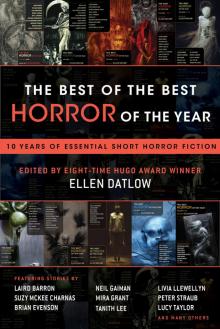 The Best of the Best Horror of the Year
The Best of the Best Horror of the Year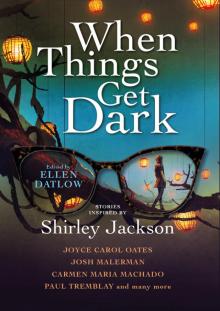 When Things Get Dark
When Things Get Dark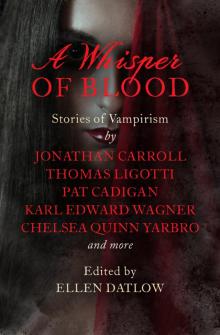 A Whisper of Blood
A Whisper of Blood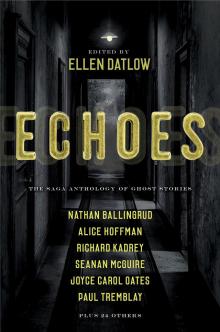 Echoes
Echoes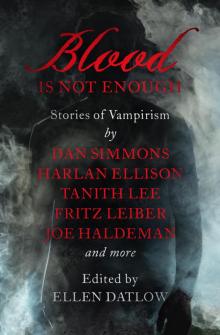 Blood Is Not Enough
Blood Is Not Enough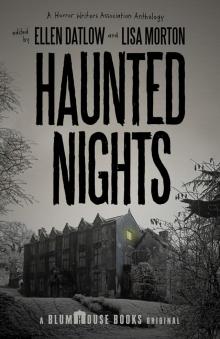 Haunted Nights
Haunted Nights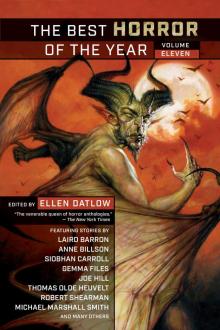 The Best Horror of the Year Volume Eleven
The Best Horror of the Year Volume Eleven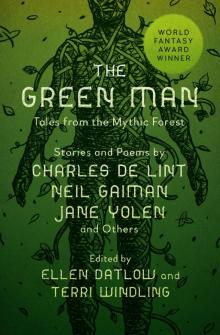 The Green Man
The Green Man The Dark
The Dark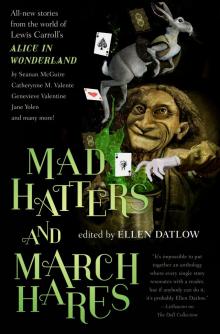 Mad Hatters and March Hares
Mad Hatters and March Hares Nebula Awards Showcase 2009
Nebula Awards Showcase 2009 The Devil and the Deep
The Devil and the Deep